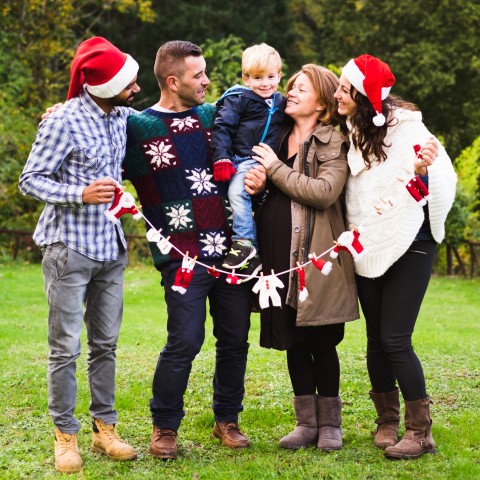As someone who married into a Taiwanese family, I speak from experience when I tell you that there is nothing more important than family here. Taiwanese people tend to be close with their families and are often willing to go above and beyond to help out a family member in need.
Family Culture in Taiwan
Three-generation households are still fairly common in Taiwan, which keeps family members especially close and allows them to lean on one another for support. Traditionally, women move into their husband’s family home and live with his parents. Parents often continue to help their sons financially into adulthood and even become the main caregivers for grandchildren while parents are at work.
Likewise, young people are expected to respect their elders and help take care of them as they age. A word that is often used in Mandarin Chinese here is 孝順 (xiàoshùn), which translates to “filial piety.” This word refers to a respect for one’s parents and elders, and is the most fundamental Confucian value. If you take good care of your parents and grandparents, people might say “你很孝順» (nǐ hěn xiàoshùn – you are very filial).
Besides taking care of their elders, a major way that people express respect is by addressing relatives by their proper titles. In North America, we’re used to calling most of our relatives by their first names, but that would be seen as rude in Taiwan, especially when it comes to greeting older relatives. Instead, you should greet them by saying who they are in relation to you. For instance, when I see my husband’s dad’s brother, I nod and say, “叔叔” (shúshu — uncle).
Unfortunately, the names for family members aren’t quite as simple as they are in English. The cultural importance of family is reflected in the language, with each family member having a very specific title. For example, Chinese has eight different words for cousins, depending on the gender of that person, whether they are on your mother’s side or your father’s side of your family, and whether they are older or younger than you.
While memorizing all these different terms can be a bit of a headache, they’ll come in handy if you need to introduce your family members to friends, or even more so if you marry into a Taiwanese family. In addition, some of these family titles are also used as polite or friendly ways to address people who aren’t related to you.
Let’s start with the basics: your immediate family members. These people are who you would usually call your family, or 家人 (jiārén).
| English | Traditional Chinese | Simplified Chinese | Pinyin |
|---|---|---|---|
| parents | 父母 | 父母 | fùmǔ |
| father | 父親 | 父亲 | fùqīn |
| dad | 爸爸 | 爸爸 | bàba |
| mother | 母親 | 母亲 | mǔqīn |
| mom | 媽媽 | 妈妈 | māma |
| siblings | 兄弟姊妹 | 兄弟姊妹 | xiōngdì jiěmèi |
| older brother | 哥哥 | 哥哥 | gēge |
| younger brother | 弟弟 | 弟弟 | dìdi |
| older sister | 姊姊 | 姊姊 | jiějie |
| younger sister | 妹妹 | 妹妹 | mèimei |
Just like in English, father (父親 fùmǔ) and mother (母親 mǔqīn) are more formal words. Most children call their dad 爸爸 (bàba) or, even more casually, 爸 (bà), and call their mom 媽媽 (māma) or simply 媽 (mā). You can also combine these words and say 爸媽 (bàmā) as a casual way to say parents, rather than saying 父母 (fùmǔ).
Extended Family Members or Relatives in Chinese
Beyond your immediate family, you also have relatives, or 親戚 (qīnqì). This is where things get tricky! Let’s start by going up a level on the family tree and looking at how to address grandparents.
How to Say Grandparents in Chinese:
- Paternal grandpa: 爺爺 yéye
Or: 阿公 āgōng (from the Taiwanese language) - Paternal grandma: 奶奶 nǎi nai
Or: 阿嬤 āmà (from Taiwanese) - Maternal grandpa: 外公 wàigōng
- Maternal grandma: 外婆 wàipó
Notice that the Chinese terms for maternal grandparents both start with the character 外 (wài), meaning “outside.” In Chinese culture, the family unit is traditionally based around the father and his surname, so the mother’s relatives are considered to be “outside” of the family.
Grandparents also address their daughter’s children according to this naming system. So, for their daughter’s children, they would call their grandson 外孫 (wàisūn) and their granddaughter 外孫女 (wàisūnnǚ). In comparison, their son’s children would be called 孫子 (sūnzi) and 孫女 (sūnnǚ).
How to Say Uncle & Aunt in Chinese:
There are quite a few different words for aunt and uncle, depending on which side of the family they are from and whether they are the younger or older sibling. Below are the terms that are usually used in Taiwan.
Uncle:
- Father’s older brother: 伯父 bófù
- Father’s younger brother: 叔叔 shúshu
- Father’s sister’s husband: 姑丈 gūzhàng
- Mother’s brother: 舅舅 jiùjiu
- Mother’s sister’s husband: 姨丈 yízhàng
Aunt:
- Father’s sister: 姑姑 gūgu
- Father’s brother’s wife: 嬸嬸 shěnshen
- Mother’s sister: 姨媽 yímā
Or: 阿姨 āyí - Mother’s brother’s wife: 舅媽 jiùmā
How to Say Cousin in Chinese:
If you thought there were a lot of words for aunt and uncle in Chinese, wait ‘til you see the list for cousin! Thankfully, there is a clear pattern to these terms, so they aren’t too hard to memorize.
The terms for cousins on your father’s side all start with the character 堂(táng) followed by the word for older/younger brother or sister, depending on the cousin’s gender and whether they are older or younger than you.
So…
- 堂哥 tánggē = older male cousin on dad’s side
- 堂弟 tángdì = younger male cousin on dad’s side
- 堂姊 tángjiě = older female cousin on dad’s side
- 堂妹 tángmèi = younger female cousin on dad’s side
For cousins on your mother’s side, the terms follow the same pattern, but they all start with the character 表 (biǎo).
So…
- 表哥 biǎogē = older male cousin on mom’s side
- 表弟 biǎodì = younger male cousin on mom’s side
- 表姊 biǎojiě = older female cousin on mom’s side
- 表妹 biǎomèi = younger female cousin on mom’s side
Starting Your Own Family
If you get married to a Taiwanese person and start your own family, you’ll probably also want to know how to introduce them!
How to say wife in Chinese:
- 妻子 qīzi is a more formal but also a more respectable term
- 太太 tàitài
This word also means “Mrs.” and can be used in front of a woman’s husband’s surname. For example, 張太太 (Zhāng tàitài) = Mrs. Chang (Chang is her husband’s surname.) - 老婆 lǎopó
This word is more colloquial and affectionate and used to talk about one’s own wife with close friends “我老婆說…”, or even to address one’s own wife directly in which case the second syllable is pronounced drawn out longer.
How to say husband in Chinese:
- 丈夫 zhàngfū
- 先生 xiānshēng
This word also means “Mr.” It can be used as a title for married or non-married men. - 老公 lǎogōng
This word is more colloquial and affectionate and used to talk about one’s own husband with close friends “我老公說…”, or even to address one’s own husband directly, again, with the second syllable drawn out longer.
How to say children in Chinese:
- 孩子 háizi = children
- 兒子 érzi = son
- 女兒 nǚ’ér = daughter
Addressing Others as Family Members
In Chinese, it’s common to use the words for family members to address others as well. Talking to others as if they are family makes people feel closer. When addressing elders, this is a sign of respect.
The word “uncle” (叔叔 shúshu) can be used for talking about older men, while the word “auntie” (阿姨 āyí) can be used for older women. The words “older brother” (哥哥 gēge) and “older sister” (姊姊 jiějie) are also often used to express affection to people who are slightly older, especially by children. When using any of these terms for elders, make sure that the person you are addressing is near the age (or older than) your actual aunts/uncles. Otherwise, people might be offended and think you are calling them old!
When learning and using these words for family members, it’s important to take cultural context into consideration. Many of the Chinese words for family members don’t exist in English, or they aren’t used in the same way. Since family is such a central part of Chinese and Taiwanese culture, it’s important to learn about these words and the ideas behind them. With this knowledge and vocabulary, you’ll be well-equipped to handle any family situation in Taiwan!
To learn more Chinese, check out Glossika! Glossika’s audio-based training improves your listening and speaking at native speed. Sign up and start your 7-day free trial:
Read more!
- Differences Between Traditional Chinese and Simplified Chinese
- How to Express Affection in Chinese: from «You’re Pretty» to «Will You Marry Me?»
- Make the Right Word Choice When Speaking Chinese
- Free Download: Glossika Chinese Pronunciation & Tone Training
- Follow Glossika on YouTube / Instagram / Facebook:
Subscribe to The Glossika Blog
Get the latest posts delivered right to your inbox
Almost everyone holds a special place in their heart for families. A family is those you’re bound with from birth, the ones who will always be there for you unconditionally. When we first meet someone, we like to be familiar with their family background. Knowing this provides valuable information on that person’s upbringing, which could shape their personality dramatically. Thus, it’s important to learn how to talk about your family in Chinese.
In China, family has great importance. 孝顺 (xiào shùn), which means being responsible and obedient to parents, is one of the best qualities a person can have. While reading this article, keep in mind that the Chinese view of parent-child relationships differs in some ways from that of Western countries.
Now let’s get right into today’s adventure!
Table of Contents
- Family Perceptions in China
- Family Member Terms and Other Basics
- Terms for Relatives
- Family Member Terms as a Married Person
- Endearment Terms
- Bonus – Interesting Expressions about Family Members
- Conclusion: How ChineseClass101 Can Help You Master Family Terms
1. Family Perceptions in China
The family institution in China is incredibly strong. China highly values family bonds, particularly parent-child relationships. When it comes to family in the Chinese culture, there are even traditions that say children should never travel far, and should always stay with their parents.
Even now, many men still live with their parents even after their marriage. In this case, the woman will have to move to the man’s house and live with his parents. This sometimes creates an unpleasant relationship between the wife and her mother-in-law, which is a situation you can see used as a stereotype in a wide variety of Chinese shows.
There are many different ways to name family members depending on your relationship to them. Age difference is the main factor in determining what to call a family member, since Chinese people heavily emphasize that youngsters should respect their elders.
One thing to keep in mind: Unlike in Western culture, it’s not respectful to directly call elders by their names. This matter will be introduced more thoroughly later in this article.
2. Family Member Terms and Other Basics
Here are some Chinese words for family members to expand your family in Chinese vocabulary! With just these basic words and phrases, you have a great place to start a simple conversation about family.
- In Chinese: 家人
Pinyin: jiā rén
In English: familyIn Chinese: 我的家庭很幸福。
Pinyin: Wǒ de jiā tíng hěn xìng fú.
In English: I have a happy family.In Chinese: 我是在单亲家庭中长大的。
Pinyin: Wǒ shì zài dān qīn jiā tíng zhōng zhǎng dà de.
In English: I grew up in a single-parent family. - In Chinese: 母亲
Pinyin: mǔ qīn
In English: mother - In Chinese: 父亲
Pinyin: fù qīn
In English: father - In Chinese: 妈妈
Pinyin: mā ma
In English: mom - In Chinese: 爸爸
Pinyin: bà ba
In English: dad - In Chinese: 姐姐 / 妹妹
Pinyin: jiě jie / mèi mei
In English: (older) sister / (younger) sisterIn Chinese: 我有个[姐姐].
Pinyin: Wǒ yǒu gè [jiě jie].
In English: I have a(n) [older sister]. - In Chinese: 哥哥/弟弟
Pinyin: gē ge /dì di
In English: (older) brother / (younger) brother - In Chinese: 兄弟姐妹
Pinyin: xiōng dì jiě mèi
In English: sibling
Fun fact: The interesting thing about siblings in Chinese is that older and younger siblings have different terms, whereas English does not.
- In Chinese: 姥爷 / 爷爷 / 祖父
Pinyin: lǎo yé / yé ye / zǔ fù
In English: (mother’s side) grandfather / (father’s side) grandfather / grandfather - In Chinese: 姥姥 / 奶奶 / 祖母
Pinyin: lǎo lao / nǎi nai / zǔ mǔ
In English: (mother’s side) grandmother / (father’s side) grandmother / grandmother - In Chinese: 父母 / 家长
Pinyin: fù mǔ / jiā zhǎng
In English: parents
Fun fact: The literal meaning of 家长 is the family’s leader.
- In Chinese: 祖父母
Pinyin: zǔ fù mǔ
In English: grandparents - In Chinese: 曾祖母
Pinyin: zēng zǔ mǔ
In English: great grandmother - In Chinese: 曾祖父
Pinyin: zēng zǔ fù
In English: great grandfather
3. Terms for Relatives
Who can say having a big family isn’t fun?
Now, let’s work our way around the Chinese family tree, so that you’ll never struggle to find the right word for a family member!
- In Chinese: 亲戚/亲属
Pinyin: qīn qi / qīn shǔ
In English: relative
Fun fact: There’s a fun Chinese term called 走亲戚 (zǒu qīn qi), which literally means “walk through relatives.” This is a tradition that Chinese people normally have during Chinese New Year, which is also known as the Spring Festival. It’s a holiday where families spend time together and catch up, just like Christmas in Western cultures. If some families can’t make the reunion, you’ll need to 走亲戚, to visit them at their place and spend some quality time. This shows that the Chinese extended family is just as important as the Chinese immediate family.
- In Chinese: 叔叔
Pinyin: shū shu
In English: uncle - In Chinese: 阿姨
Pinyin: ā yí
In English: aunt
Fun fact: In English, youngsters can usually call their elders who have no relations Mr. or Ms. and such, and sometimes if an elder is close enough, they can even directly call them by their names. This is quite different in China.
The young generation have to call adults who are older a certain term depending on the age difference. Usually, you can call people who are ten to twenty years older “aunt” (阿姨) or “uncle” (叔叔). For people who are at a similar age as your grandparents, you’re required to call them “grandmother” (奶奶) or “grandfather” (爷爷).
- In Chinese: 堂兄弟姐妹/表兄弟姐妹
Pinyin: táng xiōng dì jiě mèi /biǎo xiōng dì jiě mèi
In English: cousin
Fun fact: Since “cousin” in Chinese is a relatively long word, Chinese people usually don’t use the word “cousin.” Instead, they’ll use the terms that can show the direct relation. There are eight different terms under the category “cousin,” including: 堂兄 (táng xiōng) [male, father’s side, older], 堂弟 (táng dì) [male, father’s side, younger], 堂姐 (táng jiě) [female, father’s side, older], 堂妹 (táng mèi) [female, father’s side, younger], 表兄 (biǎo xiōng) [male, mother’s side, older], 表弟 (biǎo dì) [male, mother’s side, younger], 表姐 (biǎo jiě) [female, mother’s side, older], 表妹 (biǎo mèi) [female, mother’s side, younger].
- In Chinese: 外甥女 / 侄女
Pinyin: wài shēng nǚ / zhí nǚ
In English: niece - In Chinese: 侄子 / 外甥
Pinyin: zhí zi / wài shēng
In English: nephew
4. Family Member Terms as a Married Person
Once you’ve married in Chinese culture, you’ve gained several new Chinese family members. Here’s what to call them all!
- In Chinese: 妻子
Pinyin: qī zǐ
In English: wife - In Chinese: 丈夫 / 先生
Pinyin: zhàng fū / xiān shēng
In English: husband
I believe we all want a happy family!
- In Chinese: 女儿
Pinyin: nǚ ér
In English: daughter - In Chinese: 儿子
Pinyin: ér zi
In English: son - In Chinese: 姐夫 / 妹夫
Pinyin: jiě fū / mèi fū
In English: brother-in-law - In Chinese: 嫂子 / 弟妹
Pinyin: sǎo zi / dì mèi
In English: (older brother’s side) sister-in-law / (younger brother’s side) sister-in-law - In Chinese: 婆婆 / 岳母
Pinyin: pó po / yuè mǔ
In English: mother-in-law (husband’s mother) / mother-in-law (wife’s mother) - In Chinese: 公公 / 岳父
Pinyin: gōng gong / yuè fù
In English: father-in-law (husband’s father) / father-in-law (wife’s father)
Fun fact: In Chinese culture, if you’re on good terms with your father-in-law and mother-in-law, and you feel comfortable, it will be good to call them “mom” or “dad,” just like your wife/husband does. This shows that you see them as your own mother or father. However, in many cases, it can be difficult to get along with your father-in-law or mother-in-law.
5. Endearment Terms
Let’s use more endearment terms to call the ones you love!
- In Chinese: 爹地 / 爸爸 / 老爸
Pinyin: diē dì / bà ba / lǎo bà
In English: daddy - In Chinese: 妈咪 / 妈妈 / 老妈
Pinyin: mā mī / mā ma / lǎo mā
In English: mommy - In Chinese: 老哥 / 老弟
Pinyin: lǎo gē / lǎo dì
In English: (older) brother / (younger) brother - In Chinese: 老姐 / 老妹
Pinyin: lǎo jiě / lǎo mèi
In English: (older) sister / (younger) sister - In Chinese: 老婆 / 媳妇
Pinyin: lǎo pó / xí fù
In English: wife - In Chinese: 老公
Pinyin: lǎo gōng
In English: husband
Fun fact: 老 means “old” in Chinese, which is a very common thing to call someone who is close to you in Chinese. If you notice, lots of the nicknames mentioned above begin with a 老. In this case, 婆 and 公 each means “old women” and “old men.” By calling your other half this, it shows your commitment that you want to grow old with each other.
- In Chinese: 亲爱的
Pinyin: qīn ài de
In English: dear - In Chinese: 宝贝
Pinyin: bǎo bèi
In English: baby - In Chinese: 闺女
Pinyin: guī nǚ
In English: daughter
6. Bonus – Interesting Expressions about Family Members
- In Chinese: 虎毒不食子。
Pinyin: Hǔ dú bú shí zǐ.
In English: Even a vicious tiger won’t eat its own son.
Actual meaning: Parents will always treat their own children kindly, no matter how evil their nature is. - In Chinese: 有其父必有其子。
Pinyin: Yǒu qí fù bì yǒu qí zǐ.
In English: Like father, like son.
Actual meaning: A son’s character is very likely to resemble his father’s. - In Chinese: 不听老人言,吃亏在眼前。
Pinyin: Bù tīng lǎo rén yán, chī kuī zài yǎn qián.
In English: If you don’t listen to elders’ advice, you will learn your lesson.
7. Conclusion: How ChineseClass101 Can Help You Master Family Terms
I hope you’re now more fascinated with the unique Chinese culture after reading this article about Chinese family. Continue to binge on learning the most native and entertaining Chinese lessons at ChineseClass101.com; here, Chinese is no longer an excruciating language that’s hard to master. It’s a paradise where you can enjoy yourself even while studying!
Before you go, let us know in the comments how confident you feel naming your family members in Chinese now! And tell us common sayings or idioms about family in your own language while you’re at it! 😉 We look forward to hearing from you!
By
Last updated:
July 2, 2022
How to Talk to (or About) Family and Friends in Chinese
Friends. Food. Feelings. Identities. Weather. Family.
Maybe you’re someone who believes labels are too restrictive.
That’s totally understandable and okay.
Lots of labels can be unnecessary and limiting!
But on a practical level, language irrevocably revolves around labeling just about everything in some way.
And being able to identify different family members and familial relationships in Chinese is vital.
Whether you’re staying with a host family while studying Mandarin abroad or just want to improve your overall vocabulary, you’ll need to know who the different people in a family are in relation to each other, and what words you need to use to refer to or address them.
Luckily, Chinese family words are super easy to learn.
There are, however, quite a lot of them.
Download:
This blog post is available as a convenient and portable PDF that you
can take anywhere.
Click here to get a copy. (Download)
Why Should I Learn Chinese Family Words?
- If you’re planning on studying abroad, you may be living with a host family. Chinese family words are a necessity when identifying and communicating with each member of your host family.
- The more expansive your vocabulary is, the more fluent you become. Like with food and other basic concepts, learning Mandarin family words is not only a necessity for beginner learners, but an easy way to increase your vocabulary knowledge and take one more step towards fluency.
- Family in Chinese culture is important, so you may find family vocabulary popping up in conversation more than you’d expect. Even if you won’t be staying with a host family, learning Chinese family words is pretty vital if you ever plan on having a conversation with a native Mandarin speaker. Chinese small talk often ends up falling on family matters, so you’ll need to know the lingo.
Host Family Vocabulary Words
寄宿家庭 (jì sù jiā tíng) — host family
This term is usually used when talking about one’s host family, but not for directly addressing them.
我的寄宿家庭非常慷慨。(wǒ de jì sù jiā tíng fēi cháng kāng kǎi.) — My host family is very generous.
家庭 (jiā tíng) — family
This phrase works best for addressing a room full of family members or host family members.
早上好,家庭! (zǎo shang hǎo, jiā tíng!) — Good morning, family!
家人 (jiā rén) — family member, lit. “family person”
When it comes to addressing or speaking of individual members of your host family, you wouldn’t use terms like “cousin” or “little sister” unless you’re fairly close to them. Using descriptive family terms for people you don’t know really well comes off a bit strange.
For this reason, using 家人 or a person’s name is the best route to take. It’s also a great term to use when describing someone else’s family member if you don’t know the details of how they’re related.
我的家人非常聪明。(wǒ de jiā rén fēi cháng cōng míng.) — My family member is very smart.
朋友 (péng yǒu) — friend
Use this term to describe a close roommate or friend. You can use 朋友 to address your friend as well, but using their name is a little more common.
我的朋友艾米莉总是问 “吃了吗?” (wǒ de péng yǒu ai mǐ lì zǒng shì wèn “chī le ma?”) — My friend Emily always asks, “Have you eaten?”
死党 (sǐ dǎng) — best friend
Literally, “side kick.” You can use this term to describe your best friend, or address them (but it may be a bit better to use their name instead).
我的死党是最好的。(wǒ de sǐ dǎng shì zuì hǎo de.) — My best friend is awesome.
亲戚 (qīn qī) — relative
This term is used when describing someone, not when speaking to them.
她是亲戚吗?(tā shì qīn qī ma?) — Is she a relative?
室友 (shì yǒu) — roommates or housemates
If you’re close with your roommates, you can use this term as a sort of tongue-in-cheek way to address them. Otherwise, use 室友 when speaking about your roommates.
她的室友很搞笑。(tā de shì yǒu hěn gǎo xiào.) — Her roommate is hilarious.
闺蜜 (guī mì) — best female friend
This term is used to describe or address women only.
闺蜜,你今天看起来很可爱!(guī mì, nǐ jīn tiān kàn qǐ lái hěn kě’ài!) — Best friend, you look so cute today!
兄弟 (xiōng dì) — best male friend
This term is used to describe or address men only.
我的兄弟可以说俄语。(wǒ de xiōng dì kě yǐ shuō è yǔ.) — My best friend can speak Russian.
General Family Vocabulary Words
兄弟姐妹 (xiōng dì jiě mèi) — siblings
It’s most common to address one’s siblings by their names or by “brother” or “sister.” This term is good for describing a group of siblings.
我母亲有十二个兄弟姐妹。(wǒ mǔ qīn yǒu shí’èr gè xiōng dì jiě mèi.) — My mother has twelve different siblings.
父母 (fù mǔ) — parents
Use this term when describing parents, but not when addressing them.
我的父母正在衰老。(wǒ de fù mǔ zhèng zài shuāi lǎo.) — My parents are getting older.
父亲 (fù qīn) — father
This phrase is good for addressing and speaking of fathers. This is a more formal term to use.
他的父亲是一名警察。(tā de fù qīn shì yī míng jǐng chá.) — His father is a policeman.
母亲 (mǔ qin) — mother
This phrase is good for addressing and speaking of a mother. This is also a more formal term to use.
我的母亲是世界上最善良的女人。(wǒ de mǔ qīn shì shì jiè shàng zuì shàn liáng de nǚ rén.) — My mother is the kindest woman in the world.
爸爸 (bàba) — dad
This term is best used when addressing one’s father, but 父亲 should generally be used when speaking of a father. However, using this more affectionate term still works when talking to close people about one’s father.
爸爸去了哪里?(bà ba qù le nǎ lǐ?) — Where did Dad go?
妈妈 (māma) — mom
This term is best used when addressing one’s mother, but 母亲 should be used when speaking of a mother. As with 爸爸, you can also use this term when speaking about your mom with close friends or family.
我爱你妈妈。(wǒ ài nǐ, mā mā.) — I love you, Mom.
哥哥 (gē ge) — elder brother
Use 哥哥 when describing an elder brother or addressing him directly, as with the respective family members described by 姐姐, 弟弟 and 妹妹 (below).
我的哥哥是二十三岁。(wǒ dí gē gē shì èr shí sān suì.) — My older brother is twenty-three years old.
姐姐 (jiě jie) — elder sister
我的姐姐为谷歌工作。(wǒ de jiě jie wèi gǔ gē gōng zuò.) — My older sister works for Google.
弟弟 (dì dì) — little brother
我的弟弟只是一个孩子。(wǒ de dì dì zhǐ shì yī gè hái zi.) — My little brother is only a kid.
妹妹 (mèi mei) — little sister
你的妹妹很小!(nǐ de mèi mei hěn xiǎo!) — Your little sister is so small!
配偶 (pèi ǒu) — partner or spouse
When describing your partner or someone else’s partner, use this term. It’s a little too formal to use when addressing your own spouse.
This term is used to refer to anyone’s partner or spouse, including those in same-sex or otherwise non-traditional couples.
那是他的配偶吗?(nà shì tā de pèi ǒu ma?) — Is that his spouse?
丈夫 (zhàng fū) — husband
You can call your own husband 丈夫 if you’d like, but this term is mostly used to describe a husband.
我丈夫的名字是约翰。(wǒ zhàng fū de míng zì shì yuē hàn.) — My husband’s name is John.
妻子 (qī zi) — wife
Like 丈夫, this term is best for describing a wife (yours or someone else’s).
我爱我的妻子。(wǒ ài wǒ de qī zi.) — I love my wife.
孩子 (hái zi) — children
Literally, “offspring.” You can use this term to describe children, or to call out to a group of children if you’re a teacher or babysitter.
我有三个孩子。(wǒ yǒu sān gè hái zi.) — I have three children.
女儿 (nǚ’ér) — daughter
This is ideal for describing or addressing one’s daughter, as are 儿子, 表妹, 表弟, 表姐 and 表哥 (below) for the respective family members they represent.
我女儿在学校。(wǒ nǚ ér zài xué xiào.) — My daughter is at school.
儿子 (ér zi) — son
她的儿子是我的朋友。(tā de ér zi shì wǒ de péng yǒu.) — Her son is a friend of mine.
表妹 (biǎo mèi) — younger female cousin
我找到了表妹!(wǒ zhǎo dào le biǎo mèi!) — I found little cousin!
表弟 (biǎo dì) — younger male cousin
我的表弟是一个麻烦制造者。(wǒ de biǎo dì shì yī gè má fan zhì zào zhě.) — My little cousin is a troublemaker.
表姐 (biǎo jiě) — older female cousin
表姐, 看看我的画!(biǎo jiě, kàn kàn wǒ de huà!) — Older cousin, look at my painting!
表哥 (biǎo gē) — older male cousin
我的表哥是一位作家。(wǒ de biǎo gē shì yī wèi zuò jiā.) — My older cousin is a writer.
祖父母 (zǔ fù mǔ) — the general term for grandparents
This term is best for speaking of grandparents, be they your own or someone else’s, but 爷爷, 姥姥, 祖父 and 祖母 (see below) should be used when addressing a grandparent.
她的祖父母是政治家。(tā de zǔ fù mǔ shì zhèng zhì jiā.) — Her grandparents are politicians.
爷爷 (yé yé) — mother’s father
爷爷跑得快。(yé yé pǎo dé kuài.) — Grandpa runs fast.
姥姥 (lǎo lao) — mother’s mother
姥姥,你在家吗?(lǎo lao, nǐ zài jiā ma?) — Grandma, are you home?
祖父 (zǔ fù) — father’s father
我的祖父吃。(wǒ de zǔ fù chī.) — My grandfather eats.
祖母 (zǔ mǔ) — father’s mother
我的祖母做饭。(wǒ de zǔ mǔ zuò fàn.) — My grandmother cooks.
舅父 (jiù fù) — mother’s brother or one’s uncle
This phrase along with 阿姨, 姑母 and 叔 (below) are great for addressing and talking about aunts or uncles.
我的舅父来自台湾。(wǒ de jiù fù lái zì tái wān.) — My uncles are from Taiwan.
阿姨 (yí) — mother’s sister or one’s aunt
我有三个阿姨。(wǒ yǒu sān gè ā yí.) — I have three aunts.
姑母 (gū mǔ) — father’s sister or one’s aunt
你的姑母会来参加婚礼吗?(nǐ de gū mǔ huì lái cān jiā hūn lǐ ma?) — Will your aunt come to the wedding?
叔 (shū) — father’s brother or one’s uncle
我的叔叔很老。(wǒ de shū hěn lǎo.) — My uncle is old.
Memorizing the basic labels that describe people in a family group is something the beginner learner really needs to know.
Chinese family words really aren’t all that different from English family words, are they?
Good luck studying abroad and don’t forget to thank your 寄宿家庭 (jì sù jiā tíng — host family) for their support!
Download:
This blog post is available as a convenient and portable PDF that you
can take anywhere.
Click here to get a copy. (Download)
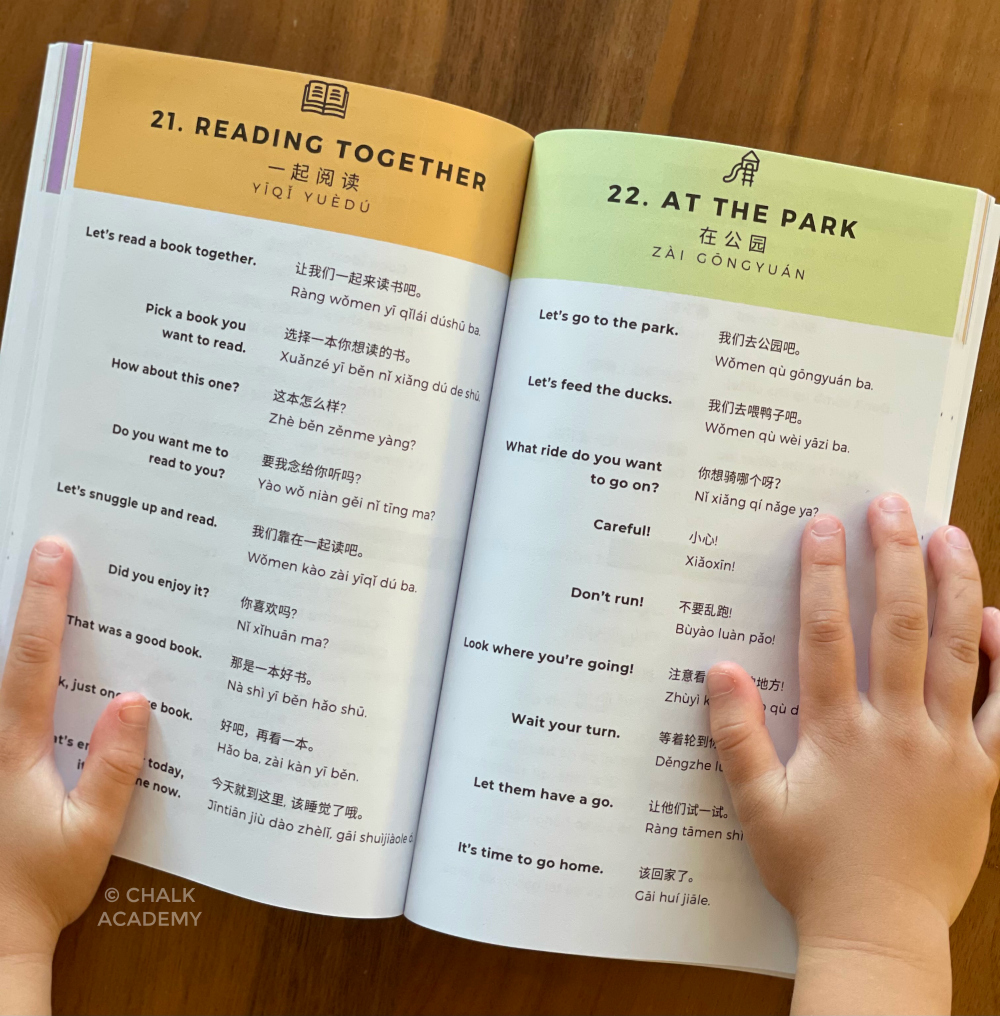
A few years ago, when I first began to learn Chinese with my kids, I took notes of common phrases I use as well as things Chinese parents say on a day-to-day basis. Many of you have asked for a list of these, so I have typed up some of the phrases here for you.
However, an even better option is that you can now get an affordable phrasebook, Everyday Mandarin for Parents, with 1500+ words and phrases! Author and bilingual parent Ann Hamilton has also published Everyday Cantonese for Parents!
Although I’m pretty conversational in Mandarin now, I bought the book because I still have gaps in my vocabulary. In English, I can rephrase sentences and think of several synonyms. But in Chinese, I sometimes only know one way to express an idea.
Therefore, Everyday Mandarin for Parents gives me more phrases to use when speaking Chinese to my kids. If only this existed a few years ago when I first started to learn!
Hamilton’s book is an incredible resource, and I can’t recommend it enough. Keep reading to learn more about this amazing phrasebook and continue scrolling for some of my go-to Mandarin phrases to learn as a parent.
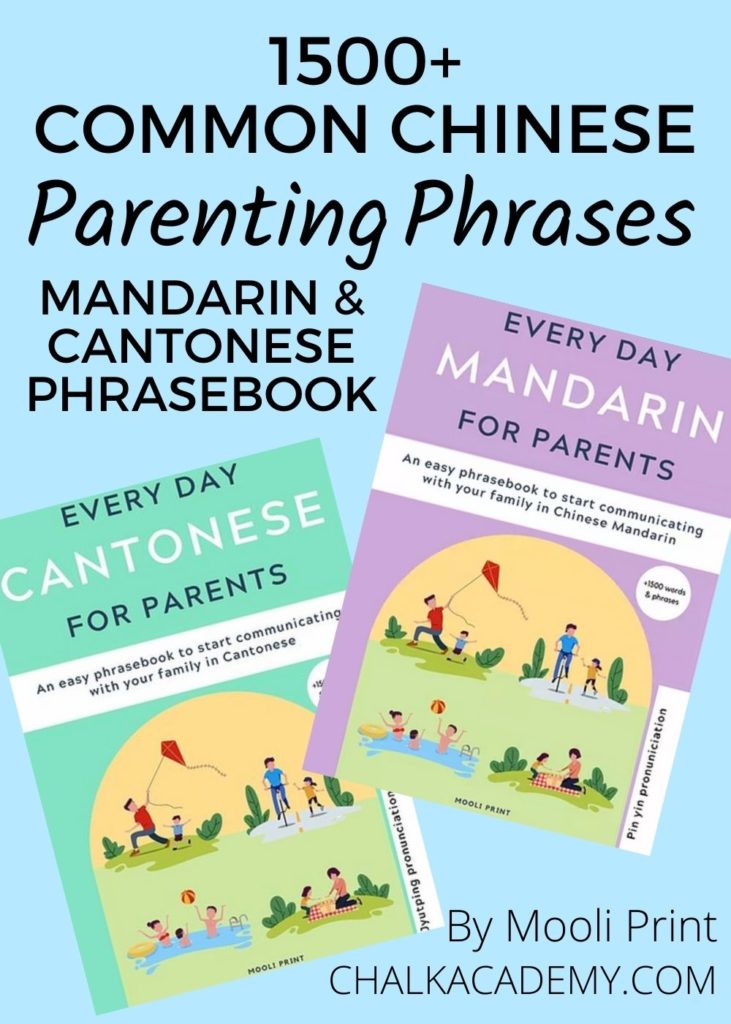
This post may have some affiliate links. If you click an affiliate link and make a purchase, I earn a small commission which supports this educational website at no additional cost to you. Please see the disclosure policy for details.
Available languages for common Chinese parenting phrases
Ann Hamilton currently has the following Chinese parenting phrasebooks:
- Everyday Mandarin for Parents: Simplified Chinese, Pinyin, and English
- Everyday Cantonese for Parents: Traditional Chinese, Jyutping, and English
- Everyday Cantonese for Parents: Traditional Chinese, Yale, and English
Each book is available in paperback as well as on Kindle. While I don’t have the Cantonese version, I see great reviews on Amazon, and it appears very similar to the Mandarin version I use.
For the bulk of this review, I will focus on the Mandarin version, but I just wanted to share the good news with Cantonese-speaking friends! All versions are currently available in the USA, UK, Canada, France, Germany, and Italy. The Mandarin version is also available in Australia.
Read this: The Best Chinese Picture Dictionaries for Kids and Parents!
Audio narration for common Chinese parenting vocabulary
For Mandarin speakers, you can conveniently use the Youdao Dictionary Reading Pen with this book. One of the biggest drawbacks of learning with a book is not hearing the pronunciation -and this reading pen solves that issue.
If you create an account on author Ann Hamilton’s website, you can listen to the Mandarin phrases and Cantonese audio for free! All of the narrations are read by native Chinese speakers, and you can hear them even before buying the books.
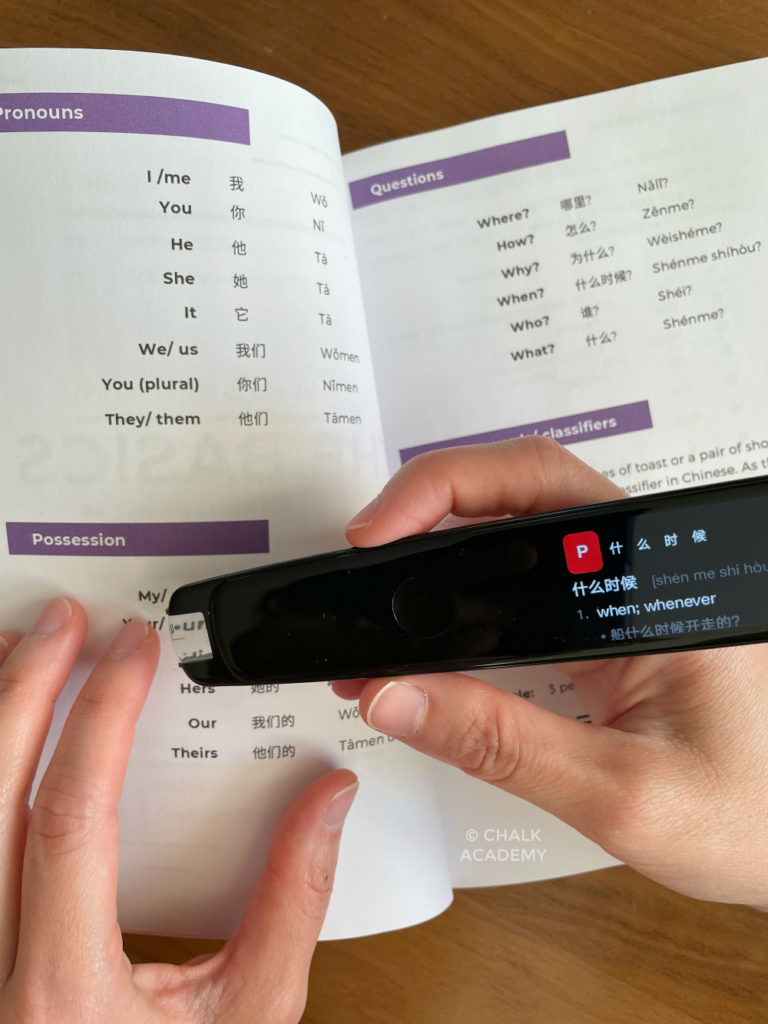
What I love about Everyday Mandarin for Parents
Everyday Mandarin for Parents starts with an overview of pronouns, possessive nouns, and common measure words (eg, classifiers). Keep in mind, Hanyu Pinyin and the Chinese tones aren’t explained in the Mandarin version. If you need a primer, check out this free audio chart by Yabla.
Read this: When Should My Child Learn Hanyu Pinyin?
Anyway, I really love how the book is organized into sections so I can easily find the most relevant words. Topics covered are as follows:
- Daily routine
- Health and personal care
- Daily activities
- Early learning and play
- Eating
- Social skills and emotions
- Sleeping
The layout is clean and uncluttered, with plenty of white space in the margins to take notes. And while the Chinese characters could be a bit larger, it’s still easy for me to read.
The book is also lightweight and portable. If you like to study on the go, it should fit in a small backpack or handbag.
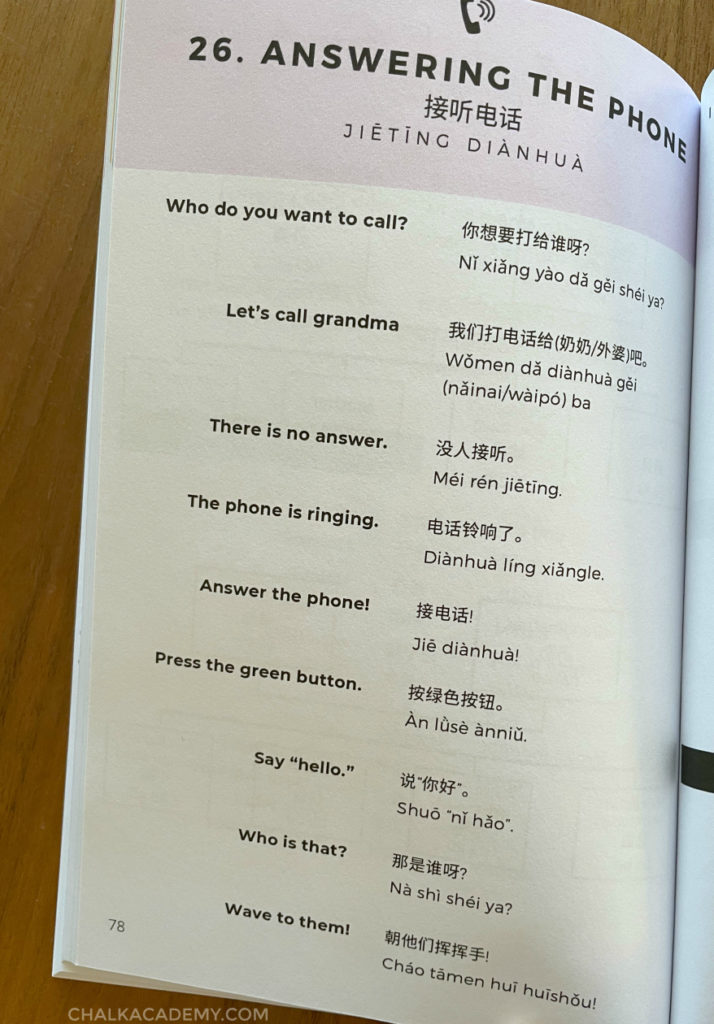
What Chinese phrases should parents learn first?
Unfortunately, most Chinese books for adult learners are geared for business travelers. However, the most relevant Chinese phrases should help parents communicate with their children. Top priority topics include basic needs, food, safety, play, hygiene, and daily routine.
Try this: How to Make the Switch from Dominant to Minority Language
A peek inside Everyday Mandarin for Parents
Here is a preview of the Everyday Mandarin for Parents book. For each page, there are soft colors and simple icons that highlight each category. However, the Cantonese version is currently only black-and-white.
Once again, I have to reiterate how much I love the organized format!
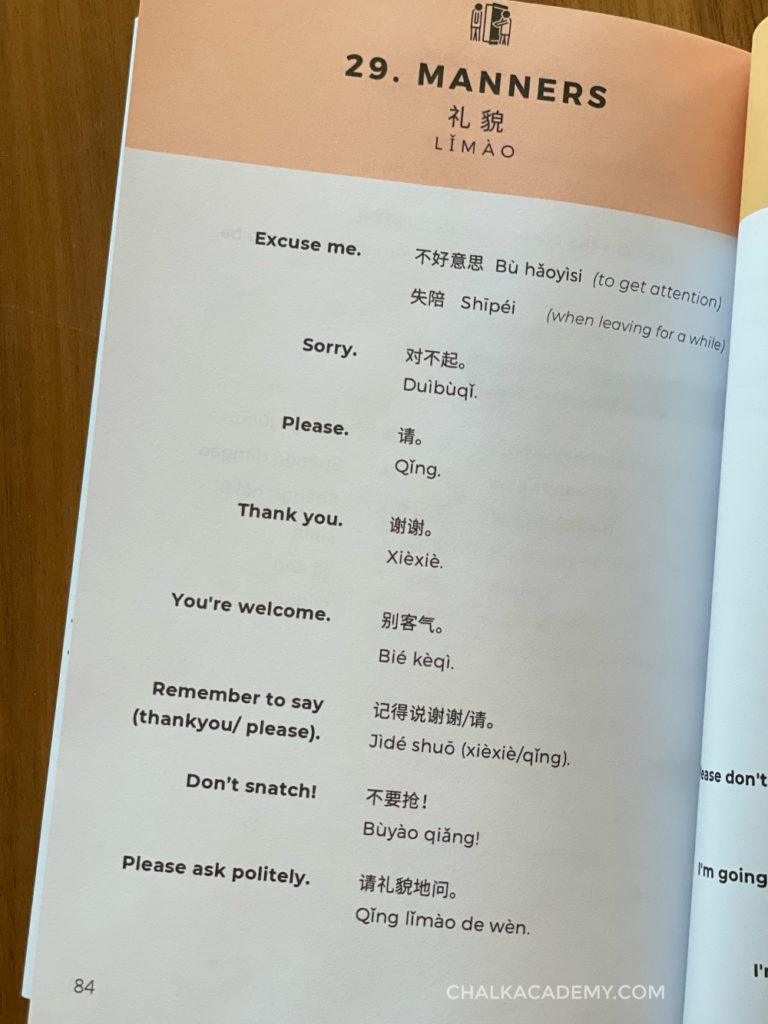
Tips for learning Chinese phrases as an adult
Kids’ brains are like sponges – they soak up languages fast!
But as adults, we can a little longer to learn new language rules outside of English. Not to mention also finding time to sit down and concentrate. As a busy parent, I get it!
Set time aside in your schedule to practice
If learning Chinese with your children is important for you, dedicate time in your schedule for language practice. This can mean 5 minutes in the morning before breakfast, 15 minutes during your work commute, or half an hour a weekend after your child goes to bed.
Find a time that works for you and your schedule and stick to it. I repeat, stick to it!
Baby steps
Remember, every step counts and gradually builds momentum. Like running a marathon, learning how to speak Chinese requires practice, persistence, and endurance.
Building a solid language foundation also means finding a pace that works best for you and your family. Start with just a few common Chinese words or phrases.
Initially, saying those first Chinese words might feel awkward. Over time, those first baby steps will become smoother and stronger strides!
Use other Chinese resources
When you are extra busy or tired, use audio and video to learn when you can’t sit down to read.
Watch Chinese TV shows, listen to Chinese audiobooks, practice on the Duolingo app, or listen to Chinese music.
You can learn more about how I learned to speak, read, and write Chinese with my children here.
Debating between simplified & traditional Chinese characters?
A few years ago, I jotted down some everyday Mandarin phrases that I found myself using often. They don’t overlap with the book, so I hope these extra Chinese phrases I’ve shared below can help you in your learning!
I have them listed in English, simplified Chinese, traditional Chinese (if different), and Hanyu Pinyin.
Common Chinese phrases about directions
- Come here!
- 过来!
- Guòlái!
- Where?
- 哪里?
- 哪裡?
- Nǎlǐ?
- Over there?
- 在那边?
- 在那邊?
- Zài nà biān?
- Here!
- 这里!
- 這裡!
- Zhèlǐ!
- Do you want to go up?
- 你想上去吗?
- 你想上去嗎?
- Nǐ xiǎng shàngqù ma?
- Or downstairs?
- 还是楼下?
- 還是樓下?
- Háishì lóu xià?
- I can’t find you!
- 我找不到你!
- Wǒ zhǎo bù dào nǐ!
- I found you!
- 我找到你!
- Wǒ zhǎodào nǐ!
- Please sit.
- 请坐。
- 請坐。
- Qǐng zuò.
- Please stand
- 请站起来。
- 請站起來。
- Qǐng zhàn qǐlái.
Common Chinese parenting phrases about affection
- Mommy and Daddy love you!
- 妈妈爸爸爱你!
- 媽媽爸爸愛你!
- Māmā bàba ài nǐ!
- Do you need a hug?
- 你要抱抱吗?
- 你要抱抱嗎?
- Nǐ yào bàobào ma?
- Do you need me to carry you?
- 你需要我背着你吗?
- 你需要我背著你嗎?
- Nǐ xūyào wǒ bèizhe nǐ ma?
- Can I give you a kiss?
- 我能亲一亲你吗?
- 我能親一親你嗎?
- Wǒ néng qīn yī qīn nǐ ma?
- I like being with you.
- 我喜欢和你在一起。
- 我喜歡和你在一起。
- Wǒ xǐhuān hé nǐ zài yīqǐ.
For more important sayings, please read 30 Positive Affirmations I Tell My Kids Everyday (English / Chinese Printable)
Common Chinese phrases about daily routine
Sleep
- Good morning!
- 早上好!
- Zǎoshang hǎo!
- Did you sleep well last night?
- 昨晚睡得好吗?
- 昨晚睡得好嗎?
- Zuó wǎn shuì dé hǎo ma?
- Are you tired?
- 你累了吗?
- 你累了嗎?
- Nǐ lèile ma?
- Do you want to sleep?
- 你想睡觉吗?
- 你想睡覺嗎?
- Nǐ xiǎng shuìjiào ma?
- Rest well!
- 好好休息!
- Hǎo hǎo xiū xi!
- Sleep well!
- 睡得好!
- Shuì dé hǎo!
Try this: Empower Kids with a Visual Daily Routine Chart in English, Chinese, Korean
Schedule
- What time is it now?
- 现在几点了?
- 現在幾點了?
- Xiànzài jǐ diǎnle?
- Can you hurry up?
- 你能快点吗?
- 你能快點嗎?
- Nǐ néng kuài diǎn ma?
- Please slow down.
- 请慢一点。
- 請慢一點。
- Qǐng màn yīdiǎn.
- I’ll wait for you.
- 我会等你的。
- 我會等你的。
- Wǒ huì děng nǐ de.
- Let’s go.
- 我们走吧。
- 我們走吧。
- Wǒmen zǒu ba.
Common Chinese parenting phrases about food
- Are you thirsty?
- 你渴吗?
- 你渴嗎?
- Nǐ kě ma?
- Are you hungry?
- 你饿了吗?
- 你餓了嗎?
- Nǐ èle ma?
- I’m so hungry!
- 我太饿了!
- 我太餓了!
- Wǒ tài èle!
- What do you want for breakfast?
- 你早餐要吃什么?
- 你早餐要吃什麼?
- Nǐ zǎocān yào chī shénme?
- What’s for dinner?
- 晚餐吃什么?
- 晚餐吃什麼?
- Wǎncān chī shénme?
- What do you want to eat for lunch?
- 你午餐想吃什么?
- 你午餐想吃什麼?
- Nǐ wǔcān xiǎng chī shénme?
- I want to eat _______.
- 我想吃 _______。
- Wǒ xiǎng chī _______.
- Do you want mommy and daddy to feed you?
- 你要妈妈和爸爸喂你吗?
- 你要媽媽和爸爸餵你嗎?
- Nǐ yào māmā hé bàba wèi nǐ ma?
- Does it taste good?
- 好吃吗?
- 好吃嗎?
- Hào chī ma?
- This is delicious.
- 这个好吃。
- 這個好吃。
- Zhège hào chī.
- This smells / tastes bad.
- 这味道不好。
- 這味道不好。
- Zhè wèidào bù hǎo.
- I’m full!
- 我饱了!
- 我飽了!
- Wǒ bǎole!
Try this: Kids Water, Snack, and Self-Care Station Makes Life Easier for Everyone
Common Chinese phrases about hygiene
- Do you have to pee?
- 你要尿尿吗?
- 你要尿尿嗎?
- Nǐ yào niào niào ma?
- Do you need to poop?
- 你需要大便吗?
- 你需要大便嗎?
- Nǐ xūyào dàbiàn ma?
- Wash hands!
- 洗手!
- Xǐshǒu!
- Wipe it clean!
- 擦干净!
- 擦乾淨!
- Cā gānjìng!
- Let’s brush our teeth together!
- 让我们一起刷牙!
- 讓我們一起刷牙!
- Ràng wǒmen yīqǐ shuāyá!
- That’s too dirty.
- 那太脏了。
- 那太髒了。
- Nà tài zāngle。
- It’s all clean now!
- 现在都干净了!
- 現在都乾淨了!
- Xiànzài dōu gānjìngle!
Common Chinese parenting phrases about safety
- Be careful! (Watch out!)
- 小心!
- Xiǎoxīn!
- That’s dangerous.
- 这很危险。
- 這很危險。
- Zhè hěn wéixiǎn.
- Walk slowly, don’t run.
- 慢慢走, 不要跑。
- Màn man zǒu, bùyào pǎo.
- This place is safe.
- 这个地方很安全。
- 這個地方很安全。
- Zhège dìfāng hěn ānquán.
- Are you hurt?
- 你受伤了吗?
- 你受傷了嗎?
- Nǐ shòushāngle ma?
- That’s not okay.
- 不行。
- Bùxíng.
Try this: 7 Natural Ways to Improve Communication Skills Through Play
Common Chinese phrases about playing
- What do you want to play?
- 你想玩什么?
- 你想玩什麼?
- Nǐ xiǎng wán shénme?
- Do you want this toy?
- 你要这个玩具吗?
- 你要這個玩具嗎?
- Nǐ yào zhège wánjù ma?
- Please give me the toy.
- 请给我玩具。
- 請給我玩具。
- Qǐng gěi wǒ wánjù.
- This is fun!
- 这个很有趣!
- 這個很有趣!
- Zhège hěn yǒuqù!
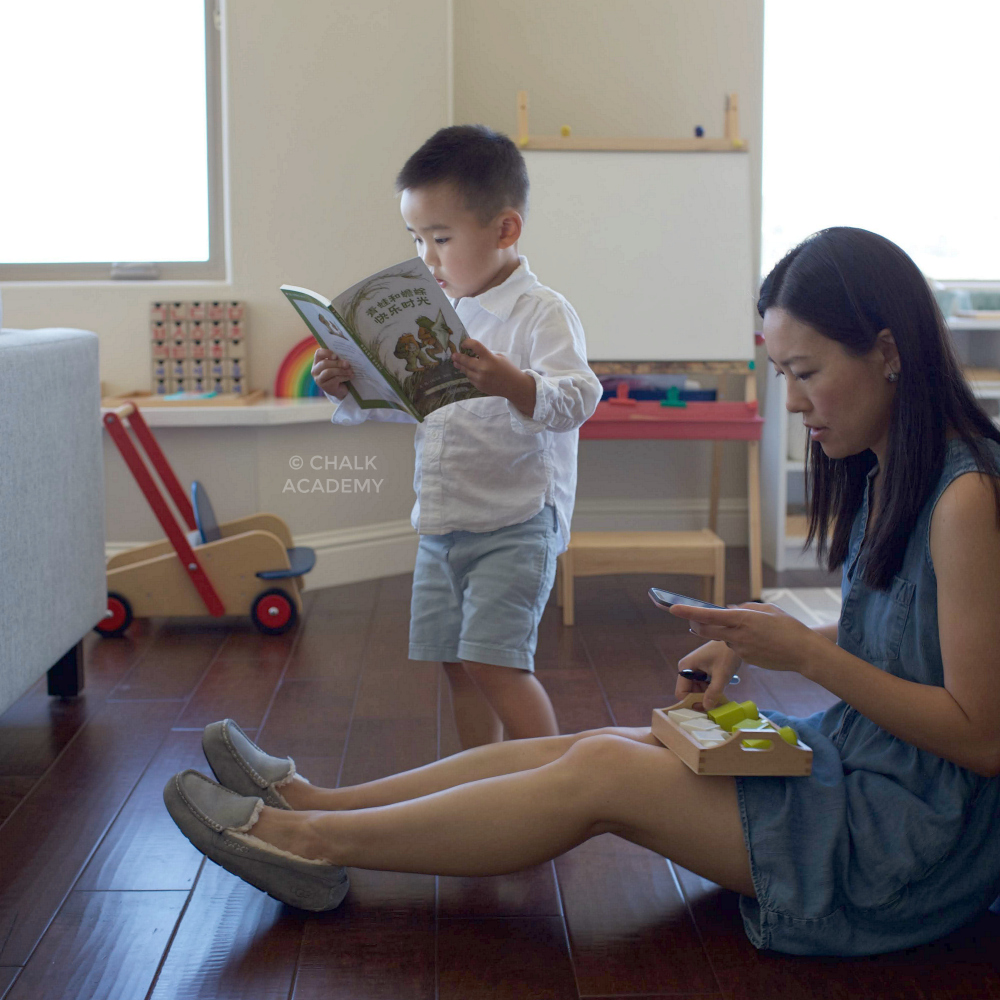
Are you learning Chinese with your kids, too?
Where are you on your journey, and what inspires you to learn Chinese? How is it going so far? Please share in the comments! I’d love to hear about your story!
JUMP START GUIDE TO TEACHING KIDS CHINESE WITH KINDNESS & CONNECTION
Free 7-Day Email Course Delivered to Your Inbox
CHALKACADEMY.COM
Cheering you on, friends!
| English | Chinese Pronunciation and Characters (Here is a tip on how to view Chinese characters) |
Sound |
| You are beautiful. | Ni3 zhen1 piao4 liang. 你真漂亮。 |
|
| You are safe with us. | He2 wo3 men zai4 yi4 qi3, hen3 an1 quan2. 和我们在一起很安全。 |
|
| We are your forever family now. | Jin1 hou4, wo3 men jiu4 shi4 ni3 yong3 yuan3 de jia1. 今后我们就是你永远的家。 |
|
| Please wait! (Or you have to wait.) | Bie2 ji2 别急 or Deng3 yi4 hui3r. (等一会儿) |
|
| Do you want water? | Ni3 he1 shui3 ma? 你喝水吗? |
|
| Are you thirsty? | Ni3 ke3 ma? 你渴吗? |
|
| You must be tired? | Ni3 lei4 le ba? 你累了吧? |
|
| Are you tired? | Ni3 lei4 ma? 你累吗? |
|
| Do you want to eat? | Ni3 xiang3 chi1 dong1 xi ma? 你想吃东西吗? |
|
| Do you want to eat formula? | Ni3 xiang3 chi1 formula ma? 你想吃formula吗? |
|
| Does it hurt? | Teng2 ma? 疼吗? |
|
| No, you may not date until you are thirty-five! | Bu4 xing2. Dao4 san1 shi2 wu3 sui4 zai4 zhao3 dui4 xiang4 ba. 不行,到三十五岁再找对象吧。 |
|
| Are you hungry? | Ni3 e4 ma? 你饿吗? |
 |
| Be good! | Guai1 yi4 dianr3! 乖一点儿。 |
 |
| Cheer up. | Gao1 xing4 yi4 dianr3. 高兴一点儿。 |
 |
| Come over. | Lai2! 来! |
 |
| Come to Mom. | Dao4 Ma1 Ma zhe4 lai2. 到妈妈这来。 |

|
| Come, let’s play a game! | Lai2, zan2 men zuo4 you2 xi4! 来,咱们做游戏。 |
 |
| Do you drink milk? | He1 niu2 nai3 ma? 喝牛奶吗? |
 |
| Don’t behave like this. | Bie2 zhe4 yang4! 别这样。 |
 |
| Drink milk or else? | He1 niu2 nai3 ne, hai2 shi4 he1 dianr3 bie2 de? 喝牛奶呢,还是喝点儿别的? |
 |
| Father (Dad) | Ba4 ba 爸爸 |

|
| Give me the toy. | Ba3 wan2 ju4 gei3 wo3. 把玩具给我。 |
 |
| Go potty? (pee, to a small child) | Yao4 niao4 ma? 要尿吗? |
 |
| Go potty? (poo, to a small child) | Yao4 la1 ma? 要拉吗? |
 |
| Go to Dad. | Zhao3 Ba4 Ba qu4! 找爸爸去。 |
 |
| Good boy (girl)! | Ni3 zhen1 guai1! 你真乖。 |
 |
| Grandma / Grandmother (dad’s mother) | Nai3 Nai3 奶奶 |
 |
| Grandma / Grandmother (mom’s mother, northern Chinese vernacular) | Lao3 Lao 姥姥 |
 |
| Grandma / Grandmother (mom’s mother, southern Chinese vernacular) |
Wai4 Po2 |
 |
| Grandpa / Grandfather (dad’s dad) | Ye2 Ye 爷爷 |
 |
| Grandpa / Grandfather (mom’s dad, southern Chinese vernacular) | Wai4 Gong1 外公 |
 |
| Hi, Amanda (the sound of name needs no translation unless in writing)! |
Wei, Amanda! 喂 («Wei» is the word to get someone’s attention.) |
 |
| Honey. | Bao3 bao. 宝宝. |
 |
| How was school today? | Jin1 tian1 de xue2 shang4 de zen3 me yang4? 今天的学上得怎么样? |
 |
| I love you. | Wo3 ai4 ni3 我爱你。 |
 |
| I will come back for you (or I will be back later.) | Wo3 yi4 huir3 jiu4 hui2 lai2. 我一会儿就来接你。 |
 |
| It’s dinner time. | Gai1 chi1 fan4 le. 该吃饭了。 |
 |
| It’s OK. | Bu2 yao4 jin3. 不要紧。 Or Mei2 guan1xi. 没什么。 |
 
|
| It’s time for bed. | Gai1 shui4 jiao4 le. 该睡觉了。 |
 |
| Let’s go. | Zan2 men zou3 ba. 咱们走吧。 Or simply Zou3 ba. 走吧。 |
 
|
| Let me pick you up. Or Pick up. | Rang4 wo3 bao4 bao ni3. 让我抱抱你。 Or Bao4 bao. 抱抱。 |
  |
| Let’s read a book. | Zan2 men nian4 shu1 ba. 咱们念书吧。 |
 |
| (Kendy) Middle School | (Kendy) zhong xue 中学 |
|
| Mother (Mom) | Ma1 ma 妈妈 |
 |
| No more crying. | Ni3 bie2 ku1 le. 你别哭了。 |
 |
| No. (not to permit) | Bu4 xing2. 不行。 |
 |
| No. (to negate) | Bu2 shi4. 不是。 |
 |
| Pick up the toy. | Ba3 wan2 ju4 jian3 qi3 lai2. 把玩具捡起来。 |
 |
| Put away the toy(s). It’s time to eat. | Ba3 wan2 ju4 fang4 xia4. Gai1 chi1 fan4 le. 把玩具放下。该吃饭了。 |
 |
| Put the toy(s) there. | Ba3 wan2 ju4 fang4 zai4 nar4. 把玩具放在那儿。 |
 |
| Share it/them among yourselves. (or Play together.) | Da4 jia1 yi4 qi3 wanr2. 大家一起玩儿。 |
 |
| school | xue2 xiao4 学校 |
 |
| This is your dad. | Zhe4 shi4 ni3 de ba4 ba. 这是你的爸爸。 |
 |
| Want to go to the bathroom (to an older child) | Xiang2 qu4 ce4 suo3 ma? 想去厕所吗? |
 |
| What do you want to eat? | Xiang3 chi1 shen2 me? 想吃什么? |
 |
| Teddy Bear. | Xiao3 xiong2 小熊 |
 |
| Yes! (to permit) |
Xing2. |
 |
| Yes. (to affirm) | Shi4 (de). 是(的) |
 |
Tones of Chinese Pinyin
The
numerals 1,2,3,4 at the end of each syllable stands for the different
tones, 1 for the flat tone ; 2, the rising tone
;
3, the falling-rising tone and
4, the falling tone . Absence of numerals represent light or no tone.
Here
is a link to practice the tones.
For
more information about Pinyin, visit my pinyin
links.
Related
links:
Get your child a Chinese name
by typing in his/her first and last name and picking a desired essence
of the name
See how some popular English
first names are written in Chinese?
Children’s
nursery rhymes.
Visit my China web site for
information about the country.
Here is a site for those who are interested in learning Cantonese.
This is
a comprehensive site on Chinese — dictionaries, online readings, Pinyin
Chat and more — zhongwen.com.
Here is a site for those who are interested in learning Cantonese.
Visit my China web site for information about the country.
Developed by Haiwang
Yuan haiwang.yuan@wku.edu
Copyright: 1996-2009 Haiwang Yuan with Remy Guo. All rights reserved.
Last updated: May 26, 2009








